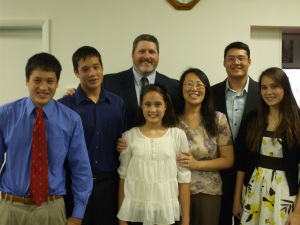Nestled among the popular beaches and tourist attractions of southern Florida, sits one of the most isolated churches in the URCNA.
Trinity Reformed Church in Cape Coral is almost 900 miles and over 13 hours from its nearest URC neighbor (Covenant URC in Pantego, NC). Located near many vacation destinations, it receives numerous visitors but few remain to strengthen the congregation. Despite those isolation and membership challenges, Trinity’s people overflow with joy.
“I don’t believe this is unique,” says Rev. Steven Wetmore, “but when I think of the Trinity congregation, I well up with joy. We are such a joyous, happy family. There is a genuine love and kindness and welcoming atmosphere. I think it’s because we are all so thankful for the grace of Jesus Christ in our lives.”
Rev. Wetmore explains how his view has changed about the many vacationers who visit the church, but are rarely seen again. “Early on this discouraged me. I was eager to hear that these people were local and would come back, but so often they are down only for a week. I look at that differently now and I encourage our people to consider this a wonderful opportunity by God’s grace. We are little, but we could influence one person who will go back to their church, their home, their community, and who knows what God will do? God loves to use small things and small beginnings so He may receive the glory. That is very encouraging.”

Like many small churches, Trinity’s congregation is close-knit. The church’s bond and small size mean most problems are known to everyone, which allows the entire congregation to minister to each other directly and intentionally. On the flip side, knowing everyone’s problems can also be a burden. But it’s helpful to share that load.
And like many small churches, finances are a challenge. Each month the church struggles to pay operating expenses and property repairs, when they’d love to spend more on fellowship and outreach. In fact, even congregational fellowship suffered this summer when the church couldn’t afford to repair the air conditioning system.
“As a pastor,” says Rev. Wetmore, “I often find myself trying to reassure the Council that God will provide and that we mustn’t fret or ever trust in ‘Assyria or Egypt,’ someone or some thing other than Him (such as the seasonal giving of ‘snow birds’ or the neighbor who rents some of our property or any kind of gimmick).”
Asked about what larger churches with more resources can do to help, he said, “We don’t fault our big sister churches. They do so much and spend a lot on things we can’t. They make up where we feel we haven’t done our part financially—and wish we could do more. It becomes a little embarrassing and difficult to continue to ask for help. We feel like that family member who just can’t keep a steady job and continually hits up his brothers for money. So we try hard not to ask. But that borders, I suppose, on pride. We try to find the right balance of humility.”
He adds, “I think we sometimes do wish larger churches would see our need and the importance of our work. We want to hold aloft the light of the Reformation, here in Cape Coral, for the Lord. Maybe there’s a perception that an established church, which has been around for a while, should be able to make it. By God’s wonderful provision, we have and will. But I sometimes wish we could be viewed similarly to a church plant or missionary effort. There is much more zeal and excitement for supporting those than there is for struggling small churches. Yet we feel we are doing as vital a work.”
Another problem common to small congregations is the lack of qualified personnel. Volunteers are spread thin and tend toward burn out. Most Sunday school teachers have no substitutes. To give teachers a break during the summer, the church holds a combined Sunday school.
Pastor Steve teaches many classes and frequently spends more time on administrative or diaconal duties than he should. Finding appropriate pulpit supply is often challenging for Trinity, due primarily to its distance from other churches. Paying for someone’s flight to Florida is out of the question for the small congregation.
You may think a church with three ministers would have no problem with pulpit supply, but it’s important to clarify that statistic. As academic dean of MINTS, Dr. Cornelius (Neal) Hegeman travels extensively and only worships with the Cape Coral faith community about two Sundays per year. The third pastor associated with the church, Rev. Richard Stevens, has been retired since 1996, but still helps as much as he is able, including serving as Clerk of Council.
Rev. Wetmore explains that, while the statistics may be technically accurate, they fail to reflect the full picture of the congregational demographic.
“We were for a long time a very senior church, with many widows. My family was the youngest and nearly the only one with children, but that has drastically changed the last year or two. The church family looks a lot different—lots of children running around.”
Although the congregation wants to attract new members, it focuses first on the ministry of the preached word. That foundation guides strategies to increase awareness of the church’s existence. Word of mouth is helpful, but Trinity URC has found posting sermons on the sermonaudio.com website to be most helpful.
“Website and internet advertising is very important due to our lack of resources or feet for more formal evangelism,” says Rev. Wetmore. “Sermon Audio gives us a bigger footprint, and probably about 90 percent of our visitors have found us through this. They do, however, seem a little surprised at our size when they arrive.”

Pastor Steve and his wife, Wanson, have five children between the ages of 13 and 21. He received his M.Div. from the Master’s Seminary in 1998, served as an interim pastor for a year in California, and relocated to Cape Coral when he came to visit family in 2006, but decided to stay. After Rev. Allen Vander Pol, who served Trinity for 13 years, became a full-time missionary in 2010, Rev. Wetmore pastored the congregation. He was installed in October of 2012, after sustaining a rigorous examination in Classis Eastern US.
“I was treated very graciously in Classis, but they were tough,” he says. “Also, during the two years prior to my classis exam, my own elders required a lot of training and reading. It was a little daunting, but it is necessary to vet and prepare those coming from outside our tradition. While the URC is welcoming, she must ‘contend earnestly for the faith, once for all delivered to the saints’ (Jude 1:3).”

He sees that commitment to doctrinal faithfulness necessary in the local church as well. “I hope I can strike the same balance in our church—welcoming to all, including those outside the Reformed faith background, but uncompromising with biblical truth and confessional tradition. That is the challenge for any church, to be welcoming and yet not allow ourselves to drift. Pastors need to be always training the flock in biblical tradition, explaining what we believe, defending why we do what we do. But we need to do it graciously, with all the love we can muster—by and for Christ.”
Trinity Reformed Church of Cape Coral is located at 2220 Hancock Bridge Parkway in Cape Coral. It meets for Sunday school at 9:15 and morning worship at 10:20, with the evening service at 6:00. Monthly prayer meetings and family fellowship/game nights are scheduled once per month. More information can be found at the church’s website: http://www.trinityurc.com.


